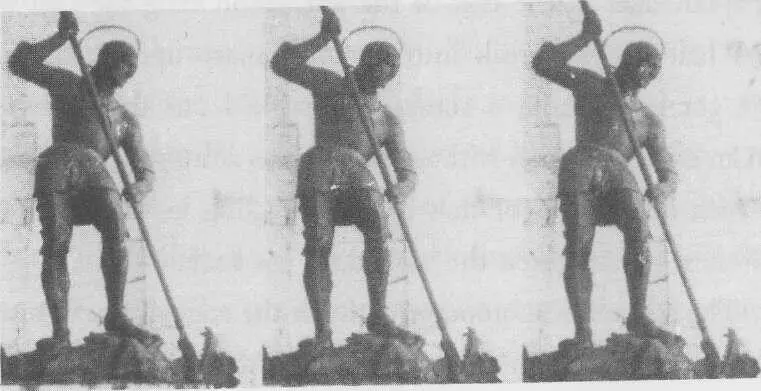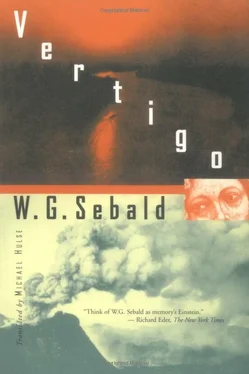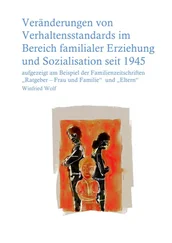Winfried Sebald - Vertigo
Здесь есть возможность читать онлайн «Winfried Sebald - Vertigo» весь текст электронной книги совершенно бесплатно (целиком полную версию без сокращений). В некоторых случаях можно слушать аудио, скачать через торрент в формате fb2 и присутствует краткое содержание. Год выпуска: 2001, ISBN: 2001, Издательство: New Directions, Жанр: Современная проза, на английском языке. Описание произведения, (предисловие) а так же отзывы посетителей доступны на портале библиотеки ЛибКат.
- Название:Vertigo
- Автор:
- Издательство:New Directions
- Жанр:
- Год:2001
- ISBN:978-0811214858
- Рейтинг книги:4 / 5. Голосов: 1
-
Избранное:Добавить в избранное
- Отзывы:
-
Ваша оценка:
- 80
- 1
- 2
- 3
- 4
- 5
Vertigo: краткое содержание, описание и аннотация
Предлагаем к чтению аннотацию, описание, краткое содержание или предисловие (зависит от того, что написал сам автор книги «Vertigo»). Если вы не нашли необходимую информацию о книге — напишите в комментариях, мы постараемся отыскать её.
Vertigo
The Emigrants
The Rings of Saturn
The New York Times Book Review
The Emigrants
Vertigo — читать онлайн бесплатно полную книгу (весь текст) целиком
Ниже представлен текст книги, разбитый по страницам. Система сохранения места последней прочитанной страницы, позволяет с удобством читать онлайн бесплатно книгу «Vertigo», без необходимости каждый раз заново искать на чём Вы остановились. Поставьте закладку, и сможете в любой момент перейти на страницу, на которой закончили чтение.
Интервал:
Закладка:
From deep in the hunter's chest came a heavy moaning and panting, his frosty breath rose from his beard, and time after time, when the wave surged through the small of his back, he thrust into Romana, while she, for her part, clung closer and closer to him, until the hunter and Romana were but one single indivisible form. I do not think that Romana or Schlag had any idea that I was there. Only Waldmann saw me. Fastened as always to his master's rucksack, he stood quietly behind him on the ground and looked across at me. That same night, around one or two o'clock, the one-legged Engelwirt landlord Sallaba destroyed the entire furnishings and fittings of the bar. When I went to school the following morning, the whole floor was ankle-deep in broken glass. It was a scene of utter devastation. Even the new revolving display cabinet for the Waldbaur chocolates, which reminded me of the tabernacle in church because it could be rotated, had been ripped from the bar and hurled right across the room. Things were not much better outside in the passage. Frau Sallaba was sitting on the cellar steps, crying her eyes out. All the doors were wide open, even the enormous door, fit for a bank vault, that led into the ice store, inside which the ice, stacked in big blocks one on top of the other for the summer, glinted a pale shade of blue. At the sight of the open ice store, or rather at the memory of this sight, it suddenly came to me that, whenever I stepped into the ice store with Romana, I imagined us being locked in there by accident and that, holding each other tight, we would freeze to death, life ebbing out of our bodies as slowly and silently as ice melts in the warmth of the sun.
At school Fràulein Rauch, who meant no less to me than Romana, wrote up on the blackboard in her even handwriting the chronicle of the calamities which had befallen W. over the ages and underneath it drew a burning house in coloured chalk. The children in the class sat bent over their exercise books, looking up every so often to decipher the faint, faraway letters with screwed-up eyes as they copied, line by line, the long list of terrible events which, when recorded in this way, had something reassuring and comforting about them. In 1511 the Black Death claimed 105 lives. In 1530, 100 houses went up in flames. 1569: the whole settlement devastated in a blaze. 1605: another fire reduced 140 houses to ashes. 1633: W. burned down by the Swedes. 1635: 700 inhabitants died of the plague. 1806-14: 19 volunteers from W. fell in the wars of liberation. 1816-17: years of famine in consequence of unprecedented rainfall. 1870-71: 5 fusiliers from W. lost their lives in battle. 1893: on the 16th of April a great conflagration destroyed the entire village. 1914-18: 68 of our sons laid down their lives for the fatherland. 1939-45: 125 from our ranks did not return home from the Second World War. In the quiet of the classroom the nibs of our pens scratched across the paper. Fràulein Rauch walked along the rows in her tight-fitting green skirt. Whenever she came close to me, I could feel my heart pounding in my throat. That day it never grew light outside. The greyness of the early hours lasted almost until noon and was followed immediately by a gradual nightfall. Even now, at one o'clock, half an hour before school ended for the day, the lights had to be on in the classroom. The white luminous globes hanging from the ceiling and the rows of children bent over their work were reflected in the darkened window-panes through whose mirrored surface the just discernible tops of the apple trees were like black coral in the depths of the ocean. All day an unwonted silence had spread out and taken possession of us. Not even when the caretaker at the end of the last lesson rang the bell in the hall did we break into our customary uproar; rather, we got up without a sound and packed our things away in an orderly fashion without so much as a murmur. Fràulein Rauch helped this or that child, struggling in thick winter clothes, to straighten the satchel on his back.
The schoolhouse stood on a rise at the edge of the village, and, as always when we came out at lunchtime, on that, for me, memorable day too, I looked over the open valley to my left across the rooftops to the forested foothills, behind which arose the jagged rocky ridge of the Sorgschrofen. The houses and farmsteads, the fields, the empty roads and tracks — all was deadened and still under a thin dusting of white. Above us hung the leaden sky, as low and heavy as it only ever is before a great fall of snow. If you put your head right back and stared long enough into that incomprehensible void, you could believe you saw the first flurries of snow swirling out of it. My way took me past the teacher's house and the curate's house and by the high cemetery wall, at the end of which St George was forever driving a spear through the throat of the griffin-like winged creature lying at his feet. From there I had to go down Church Hill and along the so-called Upper Street. A smell of burnt horn

came from the smithy. The forge fire had died down, and the tools, the heavy hammers, tongs and rasps were lying abandoned all round. In W., noon was the hour of things deserted. The water in the tub, into which the blacksmith, when working at his anvil would plunge the red-hot iron so that it hissed, was so calm, and shone so darkly in the pale light that fell on its surface from the open gateway, it was as though no one had ever disturbed it, as though it were destined to remain preserved in this inviolate state for ever. In the shop where Kòpf the barber practised his trade, the padded chair with its extendable headrest stood abandoned. The cut-throat razor lay open on the marbled top of the washstand. Since father had returned home from the war, I was sent once a month to have my hair cut, and nothing frightened me more than old Kòpf setting about shaving the fuzz from my neck with that freshly stropped knife. The fear became so deeply engrained in me that many years later, when I first saw a representation of the scene in which Salome bears in the severed head of John the Baptist on a silver platter, my thoughts immediately turned to Kòpf. To this day I cannot bring myself to enter a barber's, and that I should have gone of my own accord a few years ago at Santa Lucia station in Venice to have my overnight stubble removed still strikes me as a bizarre aberration. The fear that seized me at the sight of Kòpf's cabinet gave way to feelings of hope when I paused in front of the small co-op to gaze into the display window at the golden pyramid constructed by Frau Unsinn, the shopkeeper, entirely of Sanella margarine cubes, a sort of pre-Christmas miracle which, every day on my way home from school, touched me like a beacon heralding the new age which was now about to begin even in W. In contrast to the golden sheen on the Sanella cubes, everything else you could buy in Frau Unsinn's shop, the flour in the barrel, the soused herrings in the large tin drum, the pickled gherkins, the massive block of ersatz honey which resembled an iceberg, the blue patterned packets of chicory coffee, and the Emmental cheese wrapped in a damp cloth, seemed to have passed into oblivion. The Sanella pyramid, I knew, towered into the future, and while, before my mind's eye, it grew higher and higher, so high that it almost reached up to the heavens, a vehicle such as I had never seen appeared at the far end of the deserted Long Road which I had now reached. It was a lilac limousine with a lime-green roof and huge tail fins. Infinitely slow and quite soundless it came gliding towards me. Inside, at the ivory-coloured steering wheel, sat a black man who showed me his teeth, also ivory-coloured, grinning as he went past, perhaps because I was the only living soul he had seen while driving through this remote place. Since among the little clay figures assembled round our Christmas manger, it was the black-faced one of the three Magi who wore a purple cloak with a lime-green border, there was no doubt in my mind that the driver of the car that had drifted past me at that sombre midday hour was none other than King Melchior, and that he bore with him in the vast boot of his streamlined lilac limousine several ounces of gold, a frankincense caddy and an ebony box filled with myrrh. It may well be that I became quite convinced of this only later when, in the afternoon, I re-imagined that scene in the minutest detail as the snow began to fall more and more heavily and I sat at the window watching it twirl down without cease from on high and covering everything by nightfall, the stacks of firewood, the chopping block, the roof of the shed, the redcurrant bushes, the water trough and the kitchen garden in the nunnery next door.
Читать дальшеИнтервал:
Закладка:
Похожие книги на «Vertigo»
Представляем Вашему вниманию похожие книги на «Vertigo» списком для выбора. Мы отобрали схожую по названию и смыслу литературу в надежде предоставить читателям больше вариантов отыскать новые, интересные, ещё непрочитанные произведения.
Обсуждение, отзывы о книге «Vertigo» и просто собственные мнения читателей. Оставьте ваши комментарии, напишите, что Вы думаете о произведении, его смысле или главных героях. Укажите что конкретно понравилось, а что нет, и почему Вы так считаете.












